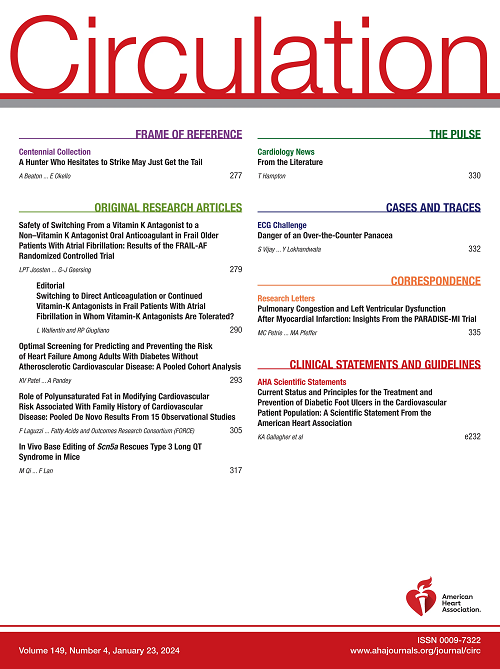Evaluation and Management of Kidney Dysfunction in Advanced Heart Failure: A Scientific Statement From the American Heart Association.
IF 35.5
1区 医学
Q1 CARDIAC & CARDIOVASCULAR SYSTEMS
引用次数: 0
Abstract
Early identification of kidney dysfunction in patients with advanced heart failure is crucial for timely interventions. In addition to elevations in serum creatinine, kidney dysfunction encompasses inadequate maintenance of sodium and volume homeostasis, retention of uremic solutes, and disrupted endocrine functions. Hemodynamic derangements and maladaptive neurohormonal upregulations contribute to fluctuations in kidney indices and electrolytes that may recover with guideline-directed medical therapy. Quantifying the extent of underlying irreversible intrinsic kidney disease is crucial in predicting whether optimization of congestion and guideline-directed medical therapy can stabilize kidney function. This scientific statement focuses on clinical management of patients experiencing kidney dysfunction through the trajectory of advanced heart failure, with specific focus on (1) the conceptual framework for appropriate evaluation of kidney dysfunction within the context of clinical trajectories in advanced heart failure, including in the consideration of advanced heart failure therapies; (2) preoperative, perioperative, and postoperative approaches to evaluation and management of kidney disease for advanced surgical therapies (durable left ventricular assist device/heart transplantation) and kidney replacement therapies; and (3) the key concepts in palliative care and decision-making processes unique to individuals with concomitant advanced heart failure and kidney disease.晚期心力衰竭患者肾功能障碍的评估与管理:美国心脏协会的科学声明。
及早发现晚期心力衰竭患者的肾功能障碍对于及时干预至关重要。除血清肌酐升高外,肾功能障碍还包括钠和容量平衡维持不足、尿毒症溶质潴留以及内分泌功能紊乱。血流动力学失调和不适应性神经激素上调会导致肾脏指数和电解质的波动,而这些波动可能会在指导性药物治疗后恢复。量化潜在的不可逆固有肾脏疾病的程度,对于预测优化充血和指导性药物治疗能否稳定肾功能至关重要。本科学声明重点关注晚期心力衰竭轨迹中肾功能不全患者的临床管理,具体重点包括:(1)在晚期心力衰竭临床轨迹中适当评估肾功能不全的概念框架,包括在考虑晚期心力衰竭疗法时;(2) 晚期外科疗法(耐用左心室辅助装置/心脏移植)和肾脏替代疗法的术前、围术期和术后肾脏疾病评估和管理方法;以及 (3) 姑息关怀的关键概念和同时患有晚期心力衰竭和肾脏疾病的患者特有的决策过程。
本文章由计算机程序翻译,如有差异,请以英文原文为准。
求助全文
约1分钟内获得全文
求助全文
来源期刊

Circulation
医学-外周血管病
CiteScore
45.70
自引率
2.10%
发文量
1473
审稿时长
2 months
期刊介绍:
Circulation is a platform that publishes a diverse range of content related to cardiovascular health and disease. This includes original research manuscripts, review articles, and other contributions spanning observational studies, clinical trials, epidemiology, health services, outcomes studies, and advancements in basic and translational research. The journal serves as a vital resource for professionals and researchers in the field of cardiovascular health, providing a comprehensive platform for disseminating knowledge and fostering advancements in the understanding and management of cardiovascular issues.
 求助内容:
求助内容: 应助结果提醒方式:
应助结果提醒方式:


